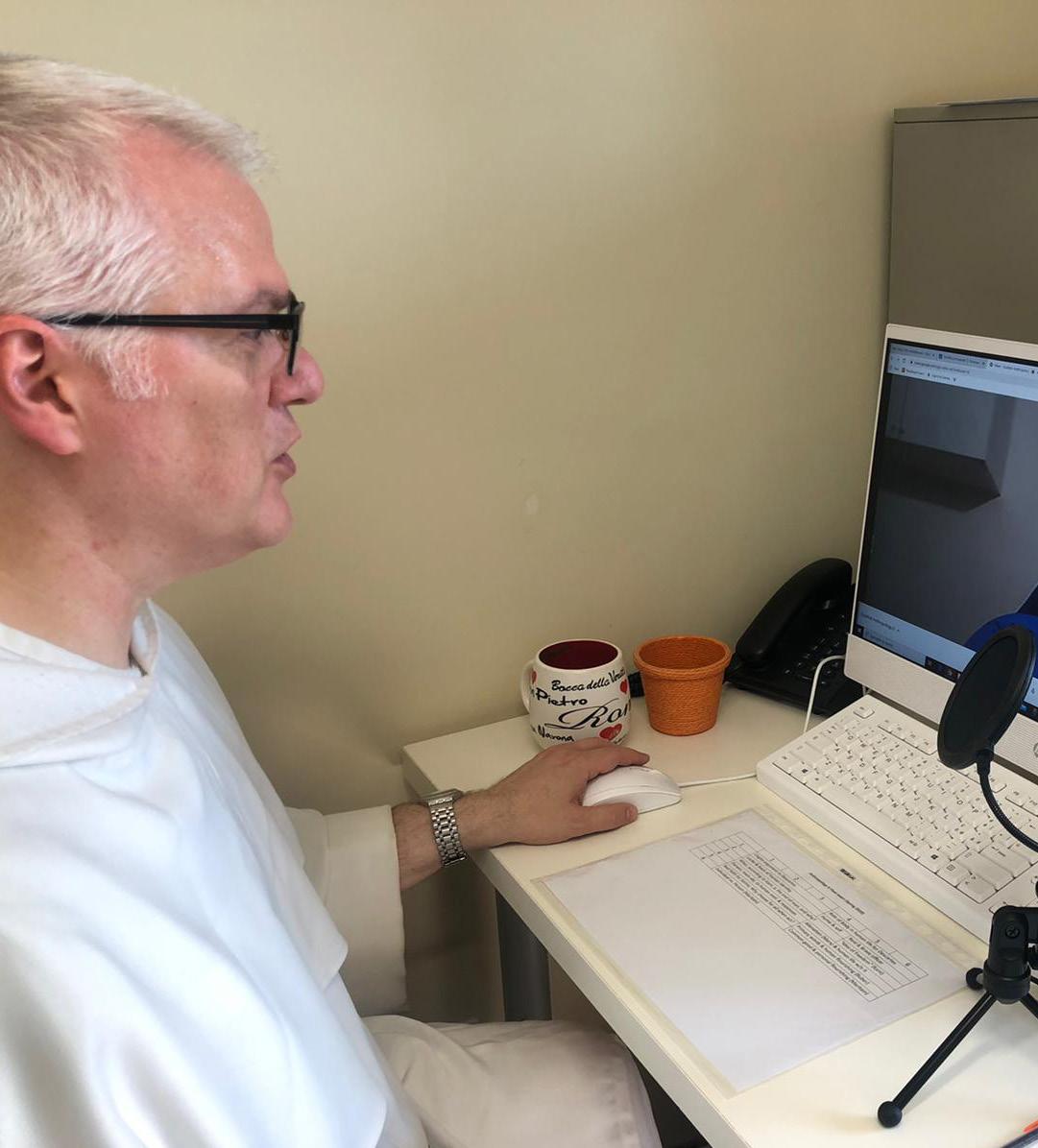
4 minute read
From Rome to the Virtual World
In the days and weeks following the appearance of COVID-19 in Italy, restrictions were implemented at a fast pace. The Angelicum followed all the regulations and recommendations of the Italian government carefully, including the closure of schools and universities beginning March 4th. In a matter of days, the Angelicum went from a bustling university in the busy days at the beginning of a new semester to a place of empty offices and classrooms, silent except for the faint sound of keystrokes. Yes, keystrokes. In a rapid effort to facilitate the continued education of the students, the deans and professors worked tirelessly to implement “smart learning." Fr. Dominic Holtz, O.P., professor of the Faculty of Philosophy and chaplain to the English-speaking students, noted, "I had to convert, and quickly— over a weekend—courses designed to be taught face to face, to go online." Angelicum student Valerie Krauel, in her first year of Philosophy, shared that she originally intended to remain in Rome for the time of closure, but when the lockdown of Italy was declared, she was on a plane home to Germany within twenty-four hours; during her flight home, the first online classes were already being held.
In line with the Dominican tradition, and animated by the Catholic understanding of the human person, the Angelicum is committed in its pedagogy to the personal, face-to-face encounter of students with their professors and with each other. However, the unprecedented situation of the COVID-19 pandemic called for a creative and energetic response from the university’s leadership, professors, staff and students alike. As Sr. Catherine Joseph Droste, O.P., Dean of the Faculty of Theology, expressed at remarks in the Mass for the Feast of Bl. Hyacinth-Marie Cormier, O.P., on May 21st , “How many professors thought just a few short months ago that ‘meet’ was simply a synonym for ‘encounter’ and ‘platform’ was a stage. How many students imagined that they would be attending classes at all hours of the day and night with other students in different time zones.” Br. Damien Habimana, F.I.C., a seminarian from Rwanda in his first year of Theology, shared that this was his first experience with online studies, and it was challenging at first. However, he highlighted the encouragement he received through the creativity and example of the professors, "the witness of continuing to do their best," despite the various challenges of schedules and technology. Admittedly, the feel of the classroom was very different when a room of students was replaced by a screen of faces. Fr. Alejandro Crosthwaite, O.P., Dean of the Faculty of Social Sciences, shared that "the energy of the students was missing" in the online setting. Nonetheless, this transition also had unanticipated benefits. As Sr. Helen Alford, O.P., Vice Rector of the University and professor of the Faculty of Social Sciences, observed, “One unexpected thing was that some students clearly found it easier to interact with the professor over
Advertisement
Br. Damien also observed that the challenges of the online classroom brought out the Angelicum’s sense of community, where no student was left behind, working to include students in many time zones and situations. The onset of the quarantine scattered the student body of the Angelicum around the world, with many returning to their hometowns and dioceses, stretching from Australia and South Korea to countries across Europe and Africa to the western coast of the Americas. Mario Torres, a seminarian for the Diocese of Tyler, Texas, U.S.A., shared, "One of the greatest challenges has been the distance and time zone. But the professors at the Angelicum were really generous and kind, sending us the recording for each lecture and we were able to continue with our semester." This creativity included not only the delivery of the lectures themselves, but also by encouraging the students and helping to keep them engaged. For example, Fr. Holtz filled the mid-class breaks with music, introducing his students to a variety of music across genres, styles, and country of origin.
Fr. Dominic Holtz, O.P. professor in the faculty of Philosophy with Sr. Maria Nneoma Ezeifedi, I.H.M.
Fr. Dominic Holtz, O.P.

This unprecedented and extraordinary semester has drawn to a close. It was an adventure that tested our limits, called forth and refined many gifts, and brought out the best of the students and faculty alike. Fr. Holtz, O.P. shared, "I think, with good humor, we have found a way to do the best we can. I am convinced that real learning has happened, while also saying that we all saw the great richness that comes from our face-toface learning, and that we very much want to return to the moment where we can engage one another, face to face, and really see how important that human interaction is." As we look ahead to the coming year, many uncertainties remain. However, the words of Mario Torres express a clear tone for this semester, which puts into words the educational vision of the Angelicum. "I want to say some words of gratitude to our professors, for their great effort and sacrifices they did in order to continue teaching classes online. This shows the commitment and responsibility of our university in order to continue forming priests and religious people to serve our










